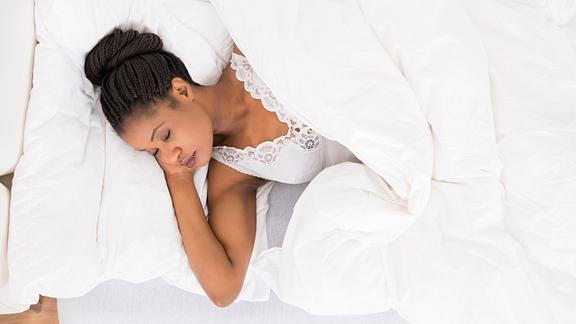
- updated: Apr. 14, 2022
- Neck Pain, Sleeping Tips, Spine Health
Sleep quality is one of the foundations of your health, and getting good sleep can be especially beneficial when dealing with back or neck pain. To help you distinguish facts from popular myths, here are 6 fast facts about sleep.
There are several techniques and sleep aids that can help you get a better night's sleep. Read Practicing Good Sleep Hygiene
- Caffeine takes longer to wear off than you think. It takes your body several hours to process through the stimulating effects of caffeine. As much as 50% of the caffeine you drink can still be active in your system 5 to 7 hours later.1 Switching to decaf in the afternoon may make it easier to fall asleep.
- Short naps are effective in moderation. Occasionally taking a daytime nap that lasts 30 minutes or less can refresh you with a boost of wakefulness.2 Indulging in longer naps, daily naps, and evening naps, however, can lead to tossing and turning.
See Should I Nap During the Day?
- A new, medium-to-firm bed may improve your sleep. Replacing an existing mattress with a new, medium-firm mattress can positively affect sleep quality and ease nonspecific low back pain for many people.3 However, its effectiveness for you in particular depends on many factors, such as your body weight and personal preference.
See Mattress Guidelines for Sleep Comfort
Exercise right before bedtime can make it harder to fall asleep. While exercising in the afternoon and evening is perfectly fine, working up a sweat at the end of the day can delay sleep. Budget at least a couple of hours between the time you finish your workout and the time you go to bed. Melatonin can help with falling sleep, but it’s not a cure-all. Taking the over-the-counter sleep aid melatonin can help with overcoming jet-lag and modestly improving sleep quality, but it is less effective for trying to treat chronic insomnia.4See Non-Surgical Treatment for a Lumbar Herniated Disc
Less sleep can make you sick. A lack of sleep has been shown to produce chronic low-grade inflammation and increase susceptibility of catching a common cold.5,6 Reduce your chances of getting ill by prioritizing sleep.See What Happens to Your Body When You Don't Sleep
If you put these facts to good use by making a few changes to your sleep hygiene, you may start benefiting from restful and restorative nights of sleep.
Learn more:
7 Tips for Getting Better Sleep in the New Year
Restorative Sleep Brings Back Pain Relief
References:
- Walker MP. Why We Sleep: the New Science of Sleep and Dreams. London, UK: Penguin Books; 2018.
- Dhand R, Sohal H. Good sleep, bad sleep! The role of daytime naps in healthy adults. Curr Opin Pulm Med. 2006;12(6):379-82.
- Jacobson BH, Boolani A, Smith DB. Changes in back pain, sleep quality, and perceived stress after introduction of new bedding systems. J Chiropr Med. 2009;8(1):1-8.
This website includes materials that are protected by copyright, or other proprietary rights. Transmission or reproduction of protected items beyond that allowed by fair use, as defined in the copyright laws, requires the written permission of the copyright owners.






